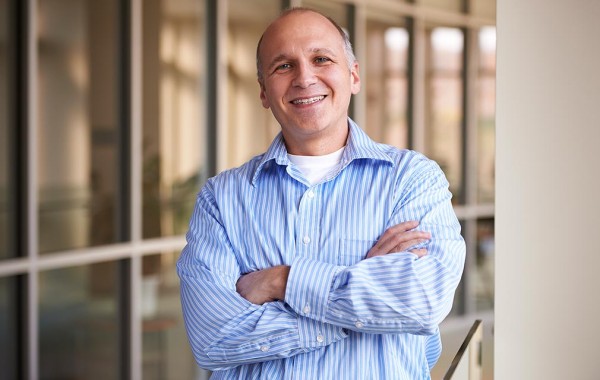
Jeff Bary
Jeff Bary is an associate professor of physics and astronomy at Colgate.
An astronomer is born. When I was nine, a friend gave me a book about astronomy titled What’s Up There? by Dinah Moche, which I read countless times. My dad, a middle-school science teacher, encouraged me to pursue the subject. He organized a series of events celebrating Halley’s Comet’s last visit in 1986. I was hooked.
On young stars. My dissertation was on the time scale for planet formation, which I’ve been researching ever since. I study young stars that are only a million years old and the geometrically flat disks of gas and dust that swirl around them. Within these disks, the dust coagulates to form planets. If you were to rewind the clock in our solar system and break up all the material currently bound in the planets, you would expect it to have a disk-like structure similar to the ones I observe orbiting these young stars.
Favorite course to teach. Saving the Appearances: Galileo, the Church, and the Scientific Endeavor [a Scientific Perspectives course] is my current favorite. It takes me out of my comfort zone. The course follows the evolution of the theological underpinnings of the Catholic Church and the evolution of the epistemology of modern science. I was trained as an astronomer, not a philosopher, but I believe I am a good thinker. This course forces me to engage with several disciplines, while exploring the science versus religion debate.
Moving Mountains. I grew up in the coal fields of Appalachia, in the poorest county in West Virginia — even though it has produced the most coal. In creating the Moving Mountains series [see story on pg. 14], I wanted to raise awareness about the social injustices occurring in Appalachian mining communities and the environmental devastation being wreaked on some of the most beautiful mountains in the world.
Raising the roof. When I was in graduate school at Vanderbilt, I experienced Nashville’s eclectic live music scene and fell in love with folk, Americana, and bluegrass. After hosting a house concert for a couple of close friends, my wife [Mary Simonson, a musicologist and an assistant professor of film and media studies and women’s studies] and I began hosting concerts regularly, featuring Americana artists passing through the area. It’s a great way to support the many talented artists. We’ve hosted nationally known musicians including Jonathan Byrd, Danny Schmidt and Carrie Elkin, and Doug and Telisha Williams.
Favorite musicians. My favorite singer-songwriter is Darrell Scott. In addition, I love Tim O’Brien, Gillian Welch, Johnny Cash, John Prine, Guy Clark… It’s a long list!
Most loved constellation. Growing up, I used to get mailers from Science News with an image of the Orion Nebula. I used to spend hours staring at the nebula from my grandparents’ backyard with my grandfather’s hunting binoculars. Today, my students and I use giant telescopes to study the young planetary systems forming in the Orion Nebula.
His burning question. Why have we not been contacted by other intelligent civilizations? In the last four years, we have learned that Earth-like planets are abundant. Therefore, the likelihood is great that other intelligent civilizations exist. Assuming they are willing to communicate with us, our lack of contact may be explained by the fact that intelligent civilizations do not exist for long on astronomical time scales. Given our propensity for destroying one another and our ecosystem, I’m afraid this might be the answer.
— Laura D’Angelo ’14






